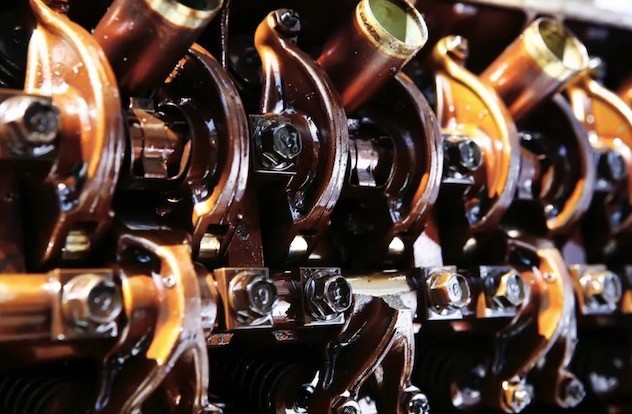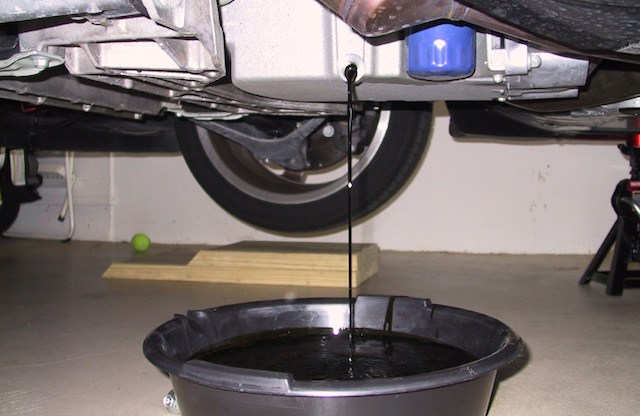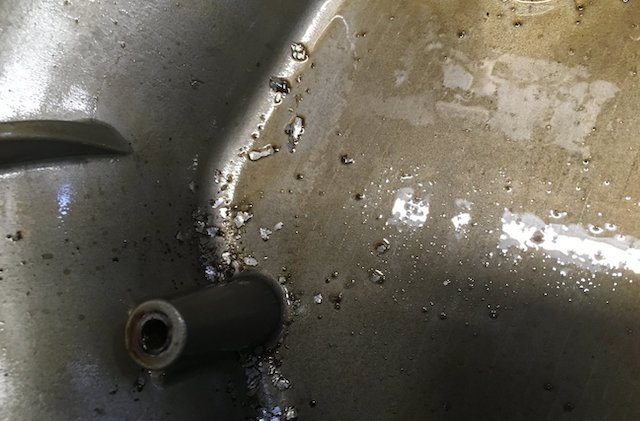All You Ever Wanted To Know About Motor Oil
Motor oil is critical to the operation of an internal combustion engine. In fact, an engine will destroy itself if it runs without motor oil for more than few seconds. As a vehicle owner, you should know the basics about motor oil. The more you know about it, the better you’re able to maintain your engine.
In this case, we got you covered. This guide has all the information you’ll ever need about motor oil.
Why Does My Car Need Motor Oil?

First things first. Let’s talk about why motor oil is so important to your engine. It’s because motor oil lubricates the engine. Engines have many moving parts that rub on each other at high speed. To prevent those parts from wearing out, an engine needs proper lubrication. Motor oil provides the long-term lubrication the engine needs while withstanding high temperatures. Motor oil also serves another important purpose. It actually cools some of the components within the engine.
This post has more information about why engines need motor oil. Your car doesn’t only need motor oil, though. It needs clean motor oil.
What Are The Benefits Of Changing The Oil In Regular Intervals?
Changing the oil in your car can be a drag. It takes time and costs money. But it’s absolutely necessary. Here’s why:
- The oil stays clean: Changing the oil in regular intervals ensures that clean oil runs through your engine at all times. Clean oil is crucial to the engine’s health and longevity. This post explains why.
- Clean oil saves you money on gas: Your engine needs motor oil with low viscosity. Clean oil has low viscosity, which means that it is thin. As oil gets dirty, it gets thicker. Thicker oil is harder to pump, which means the oil pump has to work harder to circulate oil around the engine. Fuel indirectly powers the oil pump. So the harder an oil pump works, the more fuel it uses up. This post explains the link between motor oil and fuel economy in more detail.
- Clean oil cools some of the components within the engine: Some components inside the engine are actually cooled by a continuous spray of oil. Clean, thin oil sprays well. Dirty, thick oil does not spray well. An engine with dirty, thick oil will have some components running hotter than they should, which causes them to wear fast.
- Clean oil keeps the small passageways within the engine clean: The engine lubrication system is full of small passageways. Dirty oil clogs up these passageways. This keeps some of the components from receiving clean oil. This will overheat these components and cause a lot of engine problems.
To sum it up, clean oil keeps your engine healthy and functional for a very long time. Unless you want to pay a lot of money for engine repairs, change your oil in regular intervals! Your engine will thank you.
How Often Do I Need To Change The Oil In My Vehicle?

You should change the oil every 3K-7K miles. You’ll find the exact figure in your owner’s manual. Depending on the condition of your engine (and other factors listed below), you may either:
- Need to replace your oil sooner than the recommended interval
- Wait a little longer to change your oil
The factors that determine how long motor oil will last in your engine include:
- The condition of the engine
- The amount of heat the engine generates
- Your driving/riding patterns
- The quality of the oil
- The quality of the oil filter
The good news is that you can determine the best oil change interval for your vehicle. All you need to do is to order an oil testing kit from an oil testing company. This post has more information on this.
How Often Do I Need To Replace The Oil Filter In My Vehicle?
These days, you should replace the oil filter at every oil change. It used to be OK to replace your oil filter at every other oil change. But that’s not recommended anymore. Oil change intervals have gotten longer, and oil filters have gotten smaller (to fit smaller engine bays).
If you keep your car for a long time, you’ll use up a lot of disposable oil filters. The costs will add up over time. For example, a diesel truck owner will spend up to $5,000 on oil filters alone during their truck’s lifespan.
You’ll save some money if you use a reusable oil filter. You only need to clean it when you change the oil. At PurePower!, we make quality lifetime oil filters for all types of vehicles, including trucks, cars, motorcycles, boats, and more. Here’s more information about PurePower! lifetime oil filters.
What Are The Symptoms of a Dirty Oil Filter?
When a disposable oil filter gets too dirty, it stops filtering the oil. Instead, the filter lets the dirty oil through to the engine via the bypass valve. So what happens when dirty oil that contains harmful contaminants runs through the engine? Engine components wear faster than normal. You won’t notice this immediately. But down the road, your engine will wear out a lot sooner than it should.
How Do I Tell If My Motor Oil Is Too Dirty?
The easiest way to check the condition of your motor oil is to look at the oil on the dipstick. To do this:
- Park your car on a flat, level surface.
- Turn off the engine and let it cool.
- Open the hood and then find the dipstick.
- Pull it out and then wipe the oil from it with a rag.
- Put the dipstick all the way back in and then pull it back out.
- Observe both sides of the dipstick.
You should be looking at two things:
1. The Oil Level
On the dipstick are two markings. These markings could be:
- Pinholes
- Crosshatches
- The letters L and H
- The words MIN and MAX
- Something else
The area between both markings indicates an acceptable oil level. If the oil on the dipstick either exceeds or falls below the markings, then the oil level is too high or low, respectively.
2. The State of the Oil
Next, check the state of the oil. To be more specific, take a look at the color of the oil and the consistency.
Clean oil is a lighter amber color, somewhat like maple syrup. Dark amber or brown oil may mean that the oil is dirty, but not necessarily so. Sometimes additives in the oil will turn the oil darker.
What you really want to look at is the consistency. If the oil is dark but still thin and runny, it’s still good. If the oil is almost black and/or sludgy, then it’s definitely not being filtered as well as it should be. In such a case, you need to change the oil and the oil filter as soon as possible.
How Can Metal Particles Get Into The Oil?

A lot of drivers don’t realize that metal particles can contaminate motor oil. It’s not a common occurrence, but it still happens. Motor oil that’s contaminated with metal particles will slowly ruin an engine. It creates friction between moving parts. That speeds up wear and tear, and may cause thousands of dollars in repairs. So how does this happen?
It happens when there’s metal-on-metal grinding between moving parts. Metal shavings flake off, and the motor oil picks them up.
To prevent metal particles from damaging the engine, you need magnets in your oil filter. Magnets will trap the metal particles before the oil runs through the engine again. Here’s more information about why oil filters should come with magnets. Disposable oil filters don’t come with magnets, but PurePower! lifetime oil filters do.
Does Motor Oil Expire?
Yes. Motor oil degrades over time, even when unused. If you put expired oil into your engine, it won’t provide adequate lubrication. That can lead to premature engine wear.
This is why motor oil comes with API ratings. The API rating label on the motor oil bottle will tell you two things:
- Whether the oil is for gas engines or diesel engines
- How fresh the oil is
For more information about API ratings, read this comprehensive guide to API ratings.
Are Disposable Oil Filters Bad For The Environment?
That would be an understatement. Disposable oil filters are quite detrimental to the environment. Hundreds of millions of disposable oil filters are thrown away each year. Also, leftover oil in the used filters can leak out and contaminate the local water supply.Just one person who doesn’t dispose of their used oil filters properly can contaminate at 16,000 gallons water each year. This post illustrates a grim picture of how much disposable oil filters can pollute the environment.
Do Reusable Oil Filters Exist?

Yes. It’s the 21st century, so reusable oil filters definitely exist. They solve all the problems created by disposable oil filters. To be more specific:
- In a disposable oil filter, pieces of the filter material can tear off and clog oil passageways within the engine. Reusable oil filters don’t come with any paper filter material that can tear off.
- A low quality disposable oil filter can clog before your next oil change. This causes a bunch of problems, including premature engine wear. You don’t have to worry about this problem with a reusable oil filter.
- Disposable oil filters don’t come with magnets to trap metal particles. Some good quality reusable oil filters – like PurePower! oil filters – come with strong magnets.
- Sometimes disposable oil filters come off the assembly line with loose cellulose and glue. These things can break off and then contaminate the oil in your motor. You don’t have to worry about this problem with a reusable oil filter.
- Disposable oil filters are wasteful and terrible for the environment. Reusable oil filters reduce waste.
Have A Question About Lifetime Oil Filters That Wasn’t Answered In This Guide?
If you’d like more information about lifetime oil filters, we’re the people to talk to. You’re welcome to get in touch with us. We’ll get back to you as soon as we can!
